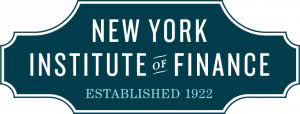Investment Banking is still one of the hardest jobs to break into. While many young graduates are flocking to tech these days, there has been no decline in the number of finance hopefuls. Especially since young graduates and whiz kids from other parts of the world are also joining the ranks now.
Breaking into investment banking or other competitive finance roles still requires great academic performance, a bit of networking, good internships, soft and hard skills, personality and even a bit of luck (don’t graduate in a recession year like we did 10 years ago!). To remain competitive, you need every advantage you can get. I talk about most of these factors in my other articles on BankersByDay, but here we are focusing on the Chartered Investment Banking Analyst (CIBA) certification from the New York Institute of Finance.
If you are wondering if its worth it, this is the question you should be asking: What will it do for my career? And to answer that question, we have to break it down into a series of smaller questions first.
1. Will it make you standout?
When it comes to markets and securities trading roles, the CFA is the gold standard. When it comes to risk management, the FRM is the gold standard. I can speak from personal experience here.
This is what makes these certifications worth it – they mark you as an expert in the field. For Investment Banking, the Chartered Investment Banking Analyst (CIBA) is undoubtedly the closest you can get. And yes, I have looked at plenty of them.
Will it be enough to get you hired on its own? No – you will still need some combination of decent academics, stellar internships or a bigshot CEO uncle. But it will mark you as someone who knows his IB stuff and it will help your chances.
2. Will it showcase your commitment to Investment Banking as a Career?
One of the big problems with finance recruitment (from the perspective of someone on the other side) is that most candidates are not genuinely interested in it at all. They just want in because they think it is “prestigious” or because they know its one of the highest paying roles. But the problem with such candidates is that they tend to burn out rather quickly.
If you are not actually interested in something, you can only fake it for so long. Especially when the work is as rigorous and demanding as it is in investment banking. Committing to earning a difficult certification showcases your interest in and your commitment to the field. That can and does have a big impact on how the person on the other side perceives you.
3. Will it make it easier for HR to shortlist you?
In the initial stages of the selection process, recruiters have to pick out a handful of candidates from a pool of thousands of CVs. What they are looking for is safe candidates. Your CV has to be structured in such a way that the recruiter feels confident that you will do well during the rest of the selection process.
Excellent grades are the best way to achieve that, as long as they are in a relevant subject like finance, accounting or math. Prestigious and relevant certifications have a similar effect.
4. Will it provide networking opportunities?
In my personal experience, the networking opportunities provided by any certification is rather limited. That should not be your primary motivation for any certification – be that the CIBA, CFA, CAIA, FRM etc. I know some companies like to state otherwise, but no one really has time for local chapters and such.
5. Is it Relevant to your career?
This depends mostly on the course content and the CIBA does fit the bill for Investment Banking quite well. The Certification is broken down into the following five modules:
- Week 1 – Financial Accounting Professional Certificate
- Week 2 – Credit Risk Analysis Professional Certificate
- Week 3 – Corporate Finance and Valuation Methods Professional Certificate
- Week 4 – Financial Modeling Professional Certificate
- Week 5 – Mergers and Acquisitions Professional Certificate
You can check the entire curriculum here.
It is apparent that this certification has been purpose built for Investment Banking. You have modules on M&A, valuation, financial modelling, corporate finance, credit risk and accounting. Each of these modules is quite massive in itself and comprehensive enough to be a career starter.
When you compare the relevance of the CIBA to something like the CFA or the FRM, it certainly comes out ahead for Investment Banking roles. CFA is for markets and securities trading roles while the FRM is better suited for risk roles and perhaps corporate banking. CIBA is what fits best for Investment Banking.
The New York Institute of Finance has been training Wall Street bankers for almost a century now, so they know what they are doing.
6. Will it provide you the career boost when you need it?

Timing is everything and it is strongly in favour of the CIBA. It will take you about a month to complete. It is available when you need it. The reason you are going for any of these certifications in the first place is to give yourself a career boost. And you need the career boost right now, not 2 or 4 years from now.
I started my CFA and FRM back when I was still in school. By the time I had completed the work experience requirements for the FRM Certification and got it in the mail, I was already a senior Associate and had still had years to go for the CFA. These certifications are awesome, but they take just too long to earn (especially the work experience requirements) and by that time, the world would have passed you by.
If you have been researching investment banking as a career, you already should know that entry level jobs are only offered to young professionals. That is because you are expected to do a lot of grunt work early on in your career and banks want young people for that. So time is not a luxury you have.
7. Is it worth the cost?
I am not going to lie and say that cost in not a factor. But I was paying off my MBA loan for years and spent a good chunk on the FRM and CFA as well. My personal view is that spending on education is always worth it. But whether the cost is worth it for you or not, can only be answered by you. After all, everyone’s value/ utility considerations are unique.
